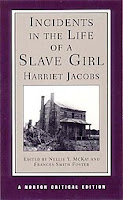 First of all, I must assert right at the beginning that it is incredibly admirable to note that Jacobs wrote this narrative by herself. It is remarkable that not only was she able to learn to read and write, but her writing style is also wonderfully skillful. I loved the ebb and flow of her words and the nature of her storytelling. And in the same way, it's also quite admirable that Jacobs was able to get the book published.
First of all, I must assert right at the beginning that it is incredibly admirable to note that Jacobs wrote this narrative by herself. It is remarkable that not only was she able to learn to read and write, but her writing style is also wonderfully skillful. I loved the ebb and flow of her words and the nature of her storytelling. And in the same way, it's also quite admirable that Jacobs was able to get the book published. The content, as you can imagine, is pretty tragic. Jacobs' parents die when she is very young, and she is eventually passed off to the cruel home of Dr. Flint. Flint sexually harasses Jacobs for years, and she fears that she will not be able to keep him away for much longer. In an attempt to avoid that, she engages in a sexual relationship with a neighboring white man, whom she considers a much preferable alternative. One of the things I find interesting in this section is her defense of this decision. Aware that many white Protestant readers may condemn her for this, she asserts that slaves cannot be held to the same moral standards because they lack the power to control their lives. I was impressed with her personal strength to stand up for herself. I think it requires a significant amount of courage and self-esteem to assert this in that time period.
After this, a lot of her narrative revolves around the great trials she endured to protect her children. I had to constantly remind myself that this was not just a story; Harriet actually endured these horrible circumstances. Likewise, her problems were not over at the time she published the narrative. In the end, she is still owned by someone else, even though her present owner is much "kinder" than those of her past. Moreover, she still does not have a home she can call her own to provide for herself and her children. It's clear that this narrative is not just a method of highlighting the horrors of slavery but a personal plea for freedom.
I believe that Harriet Jacobs' narrative should be part of the Classic Literature canon for a number of reasons. First of all, it does tell a captivating story. She writes skillfully and fully kept my attention throughout the entire work. In addition, it reveals a number of things about the human condition. I think it shows just how much a person can endure with enough motivation and strength of character. It is a message of overcoming obstacles, but it also realistically demonstrates that things don't always work out perfectly. Harriet's journey is not over, but significantly, she has not lost heart. For all these reasons and more, I think modern readers can still relate to her story today, even though slavery has been abolished.

1 comment:
I just finished this book last night, and I loved it as well! I too noticed her anxious justification for her relations with Mr Sands... It is inspirational and impressive that she should so boldly assert her authority, as the author of her story, that her sin cannot be compared to the sins of others. I loved this post, you have great insights!
Post a Comment